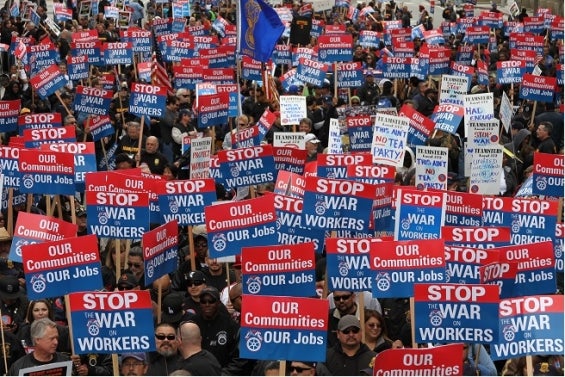Headline News
Election Results Show Voters Believe Workers Need A Raise

Tuesday was mostly a gloomy day for anyone who cares about the plight of the American worker. But despite the disappointing election results, there were a few rays of sunshine – five minimum wage ballot initiatives that passed overwhelmingly.
San Francisco became the second major city to approve a $15 an hour minimum wage, to be phased in by 2018. Meanwhile, voters in four ruby-red states – Alaska, Arkansas, Nebraska and South Dakota — gave the thumbs up to new wage floors ranging from $8.50 to $9.75 an hour. This, despite voting the same night for Republican leaders statewide.
In those four states alone, an increase in the minimum wage will result in a raise for some 600,000 workers. That’s not inconsequential. And given these pay hikes are being approved in some of the most unlikely of places, it shows there is a wide belief that the U.S. is suffering from a significant income inequality problem.
The trick will be getting a new (and more conservative) Congress to see this as well. It’s been five years since the federal minimum wage was raised to $7.25 an hour, and it has not aged well. Congress previously has been bogged down in efforts to try and raise it to $10.10 an hour as proposed by President Obama, but it is currently hard to see that going anywhere now.
The reality is, however, that while the U.S. minimum wage has remained flat, the cost of living has not. In fact, the Labor Department’s Consumer Price Index has gone up nearly 9 percent since July 2009. It’s no wonder why low-wage earners are falling behind even while they go to work each day.
Raising the federal minimum wage to $10.10 an hour, a report by the Economic Policy Institute shows, would increase the wage to where it stood in late 1960s after being adjusted for inflation. It would also directly or indirectly raise the wages of 27.8 million workers, who would receive about $35 billion in additional wages over the phase-in period. And the gross domestic product would grow by about $22 billion, which would help the economy.
Let’s not fool ourselves; no hike in the minimum wage is going to be enough to support a middle-class lifestyle for families. That’s what union jobs do, and is why the Teamsters push so hard to organize to bring higher salaries and additional opportunity to workers nationwide. But it is a start.
This is a bipartisan issue. The approved ballot measures prove it. Polling of the American electorate proves it. Now it’s time for lawmakers on Capitol Hill to prove it to their constituents that they are listening to them and give American workers a raise.